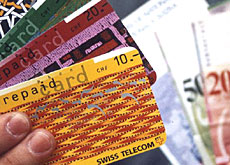Swiss hands tied in fight against terrorism

Switzerland risks being isolated when it comes to combating terrorism in Europe, warns a security expert.
As European Union interior ministers met on Friday to discuss new counter-terrorism measures, non-member Switzerland was once again left out of the loop.
The meeting in Brussels was organised in response to the bomb attacks in the Spanish capital, Madrid, which left more than 200 people dead.
Victor Mauer from the Centre for Security Studies at Zurich’s Federal Institute of Technology told swissinfo that Switzerland’s own defences may be weakened if it is not party to shared intelligence among EU member states.
“Because Switzerland is not part of the inner circle, it could be left out of certain decisions by EU ministers and heads of state,” he said.
“For example, Switzerland would to a certain extent be left out of the proposed setting up of a special commissioner to counter the threat of terrorism.”
Switzerland is currently locked in a dispute with Brussels over joining the EU’s Schengen accord on cross-border crime.
Starved of automatic access to the EU’s criminal databases, Swiss police have to rely on personal contacts abroad to obtain information.
Potential target
Although Switzerland is not considered a prime target, experts believe the authorities must be on their guard against a potential terrorist attack.
“A threat has existed since the September 11 attacks. But Switzerland is not in the direct line of fire,” said Jacques Pitteloud, a senior intelligence official at the defence ministry, in an interview with the weekly “L’Hebdo”.
However, he warned that there was a risk that Islamic militants might target foreign interests on Swiss soil.
Mauer, too, agrees that the threat of attack is low.
“If there was a list of targets, Switzerland would not be at the top,” he said “Those countries that supported the war in Iraq [would be high on the list]: for example, the United Kingdom, Poland, Spain and Italy. Then it would be Germany and France, then, perhaps, Switzerland.”
“However, this does not imply that the situation is not serious… the Madrid bombings have spread fear all over Europe,” he added.
Terror groups
In April last year, Urs von Daeniken, head of crime analysis and prevention at the Federal Police Office, warned that groups implicated in terrorist activities were in touch with people living in Switzerland.
Pitteloud admits that there are Islamic cells active in Switzerland.
“Their role, the nature of their links to al-Qaeda and their capabilities are being actively evaluated by our [intelligence] services,” he said.
Police arrested eight foreign nationals in January in connection with last May’s terrorist attacks on Westerners in Saudi Arabia.
Hands tied
Another headache for the Swiss is information gathering. Unlike some of their European neighbours, the Swiss have limited powers of surveillance.
Following the “police files” scandal in 1989, when it emerged that hundreds of thousands of people had been placed under surveillance, often for ambiguous reasons, the government dramatically reduced police powers of surveillance.
Phone taps, mail intercepts and surveillance of private premises were banned.
Swiss police have complained that their ability to investigate potential terrorist threats is severely restricted and they want to be given a freer hand.
“An internal review is underway to identify loopholes and draft proposals for strengthening our counter-terrorism response,” said a spokesman for the Federal Police Office.
The resumption of phone tapping and a green light for surveillance operations are said to feature high on the police wish list which is due to be presented shortly to the justice minister, Christoph Blocher.
swissinfo, Joanne Shields
European Union interior ministers are debating whether to set up a pan-EU counter-terrorism database.
Ireland and other EU members have proposed appointing an EU anti-terrorism chief and creating a European Central Intelligence Agency.
The emergency meeting was called after last week’s bombings in Madrid which left more than 200 people dead and 1,500 injured.
The blasts are believed to have been carried out by the Islamic militant group, al-Qaeda.

In compliance with the JTI standards
More: SWI swissinfo.ch certified by the Journalism Trust Initiative










You can find an overview of ongoing debates with our journalists here . Please join us!
If you want to start a conversation about a topic raised in this article or want to report factual errors, email us at english@swissinfo.ch.